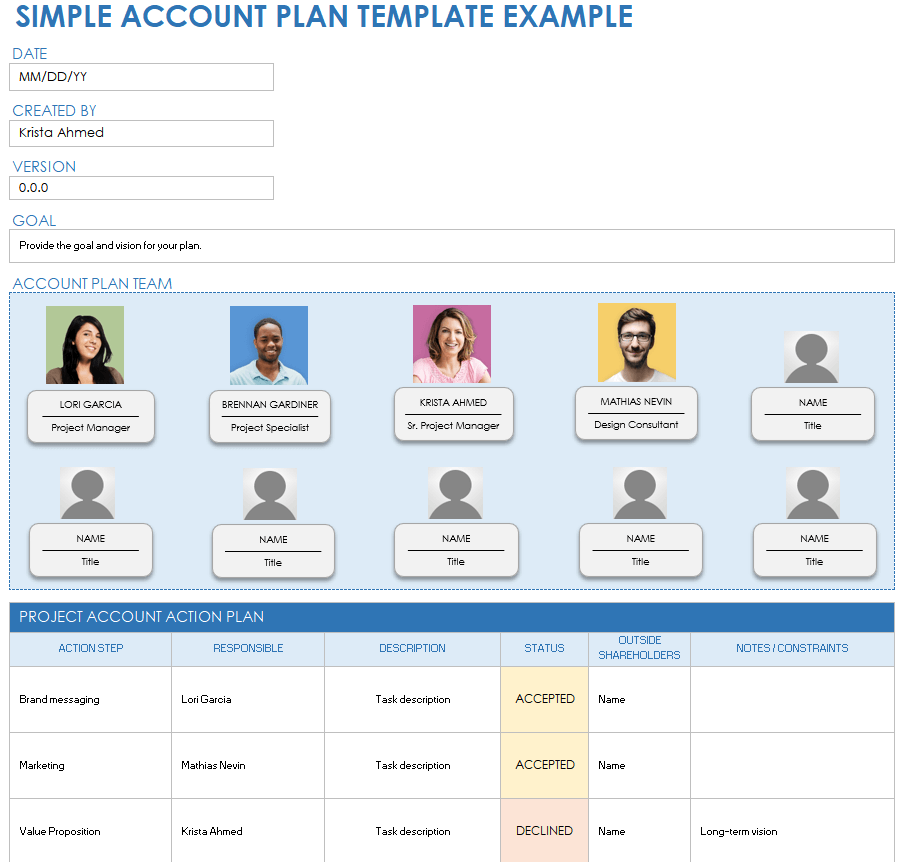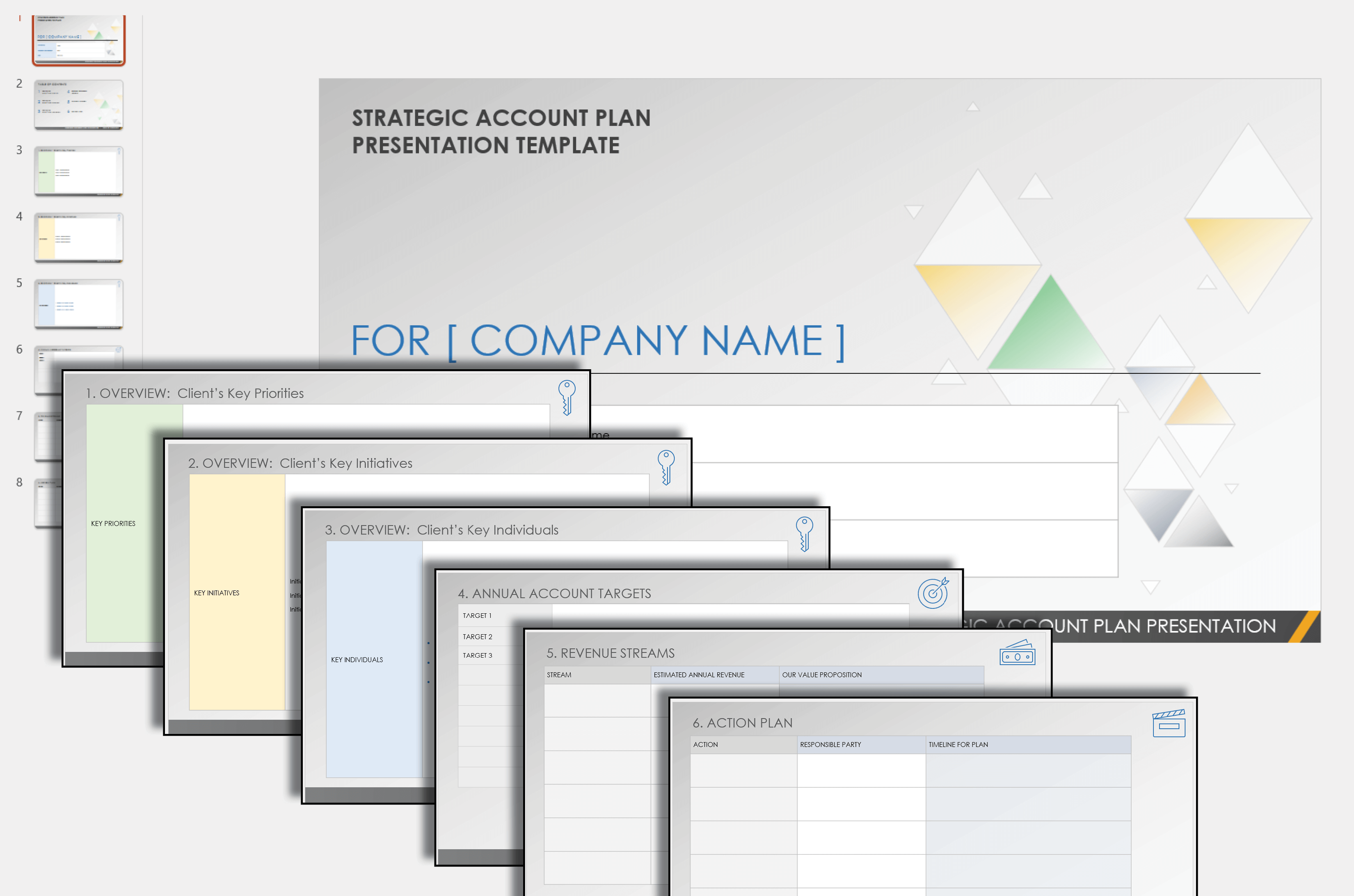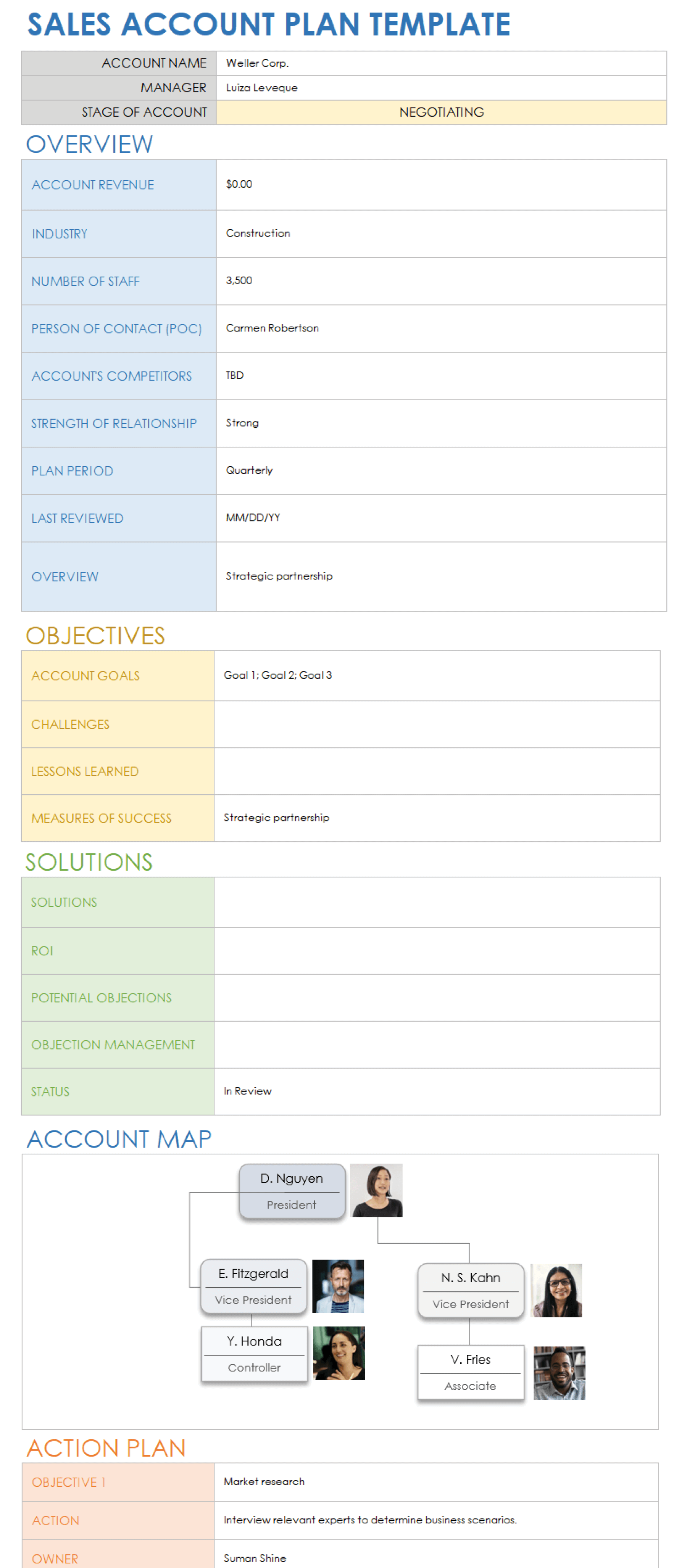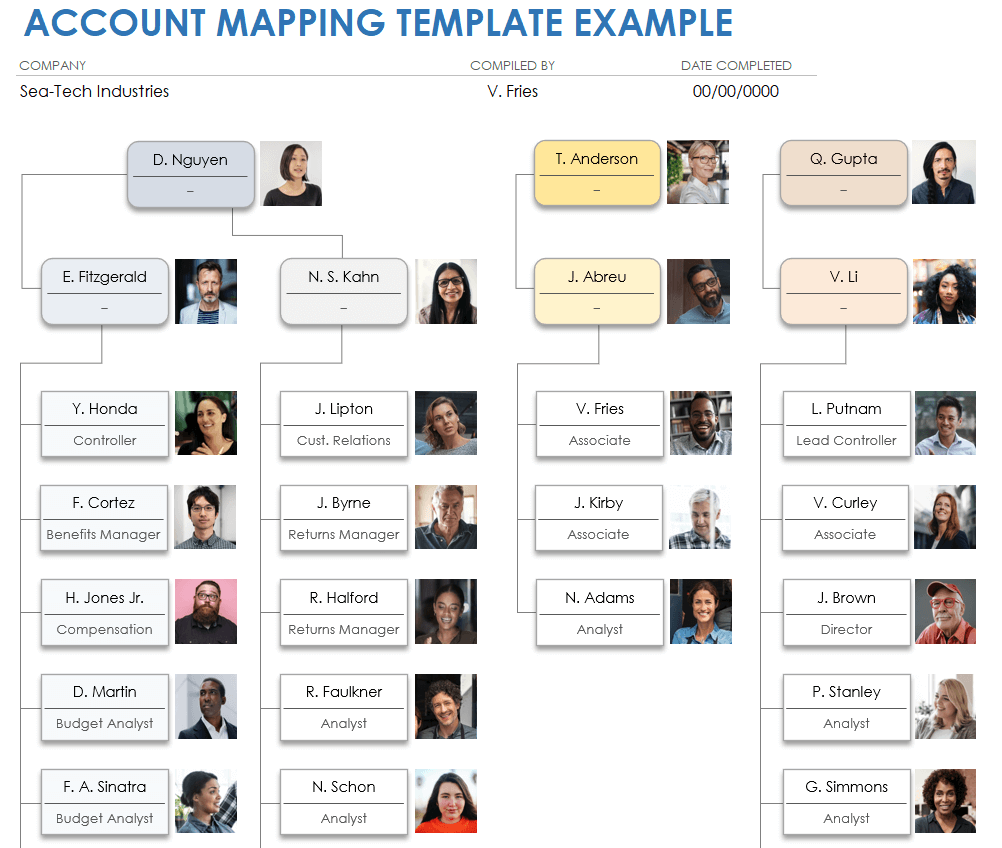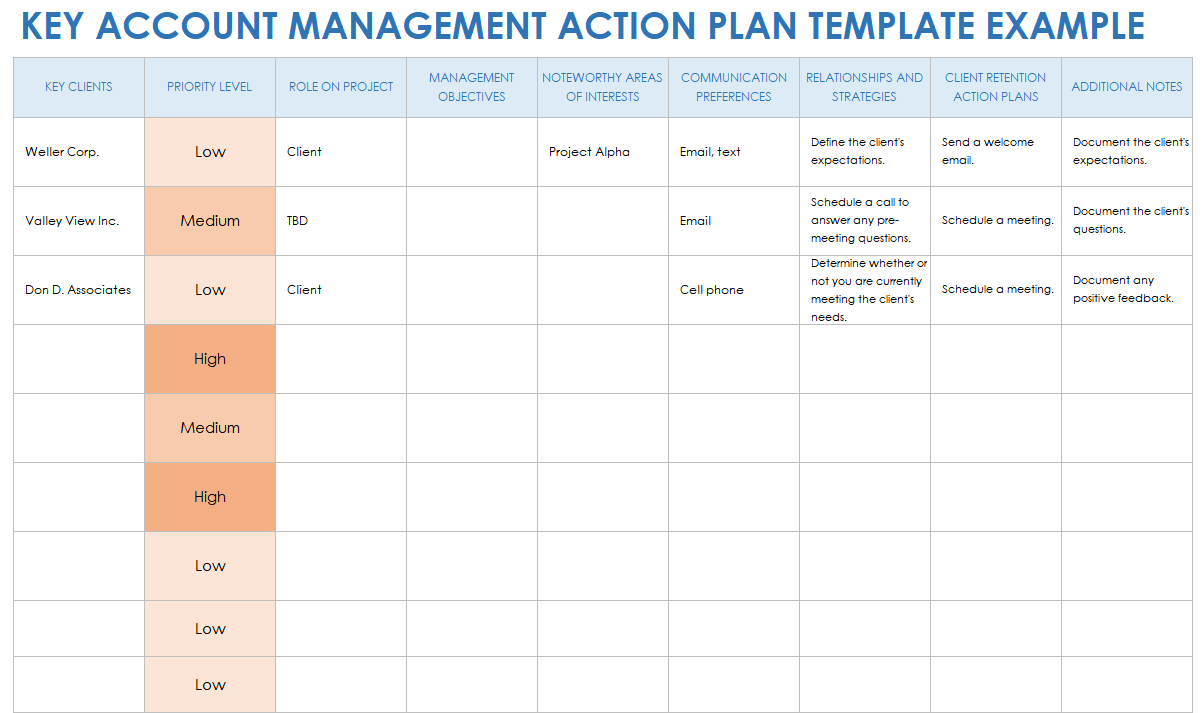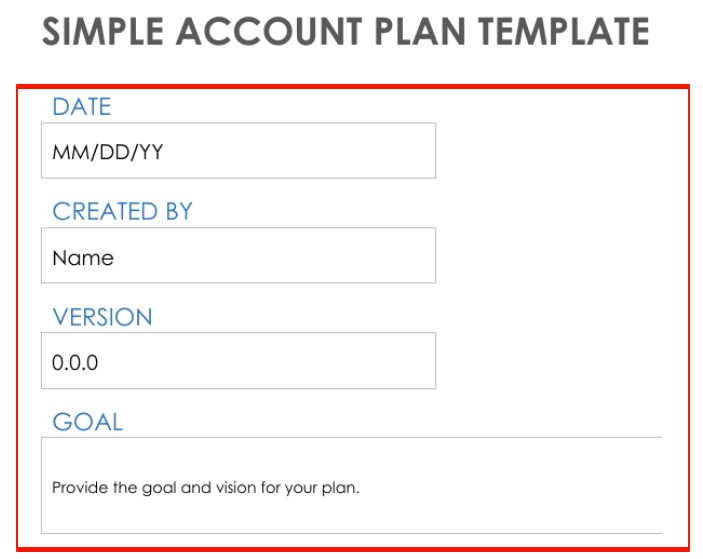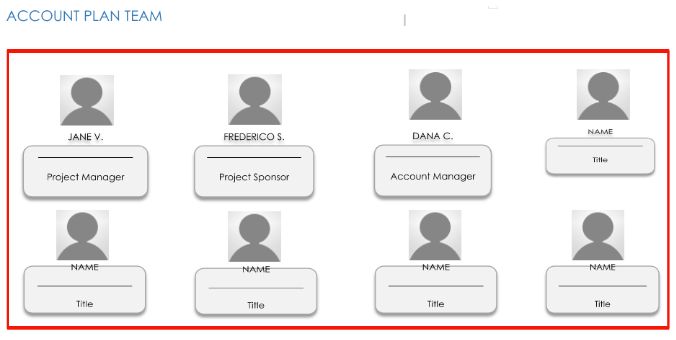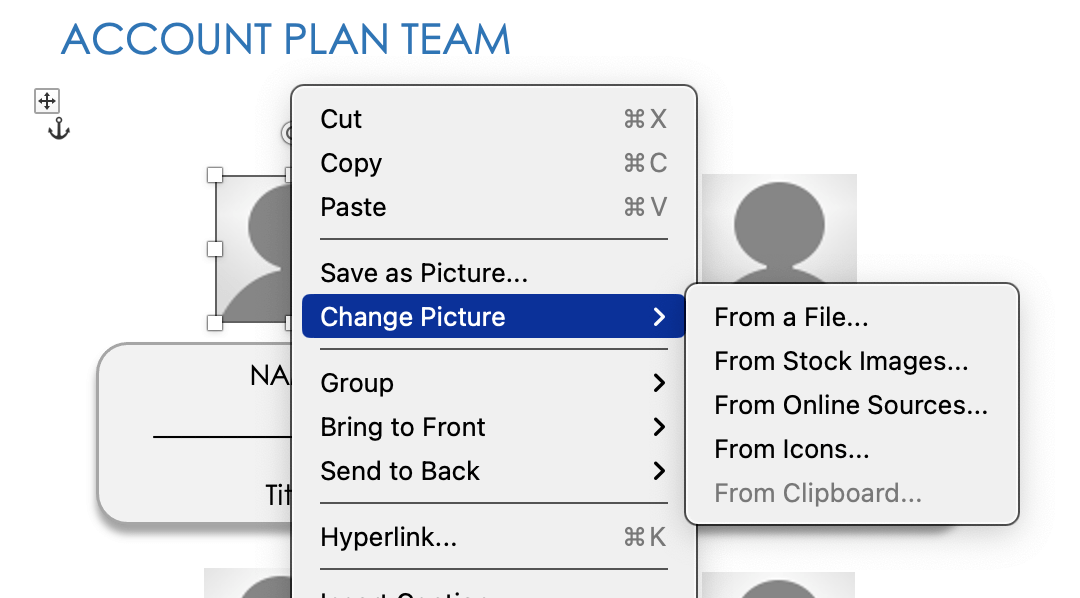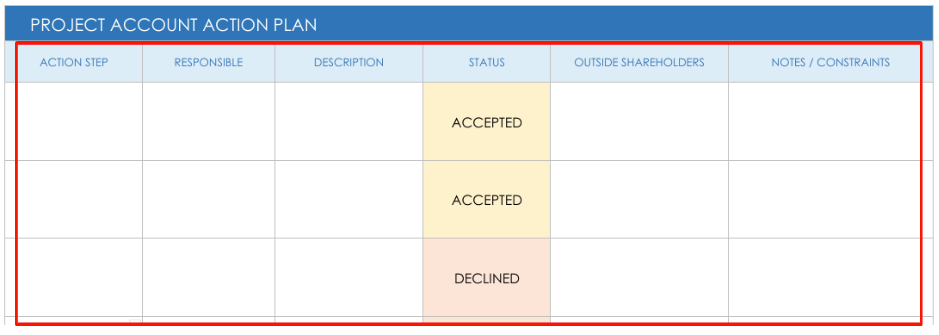Strategic Account Plan Presentation Template
Download a Strategic Account Presentation Plan Template for
PowerPoint
| Google Slides
Solidify your client-account planning and management with this dynamic strategic account plan template. Enter details of your client’s key priorities, initiatives, and people so that any team member can become apprised of the client’s goals and active players at a glance. The template also includes space to specify the client’s annual account targets and revenue streams, as well as your action plan (specific actions, assignees, and due dates) — all to ensure that you strengthen your client relationship and have a solid account plan and client-management strategy in place.
Sales Account Plan Template
Download a Sales Account Plan Template for
Excel
|
PowerPoint
|
Microsoft Word
Ensure that you proactively meet — and even exceed — your sales-account management and planning goals with this comprehensive sales account plan template. Use the template to document prospective and existing clients’ decision-making processes and other important details. Enter account-overview details (e.g., account revenue, industry, relationship strength), account objectives, account solutions, and your account action plan. This template is the perfect solution for capturing important details about prospective or existing customers and for creating a dynamic strategy to help them succeed, so you can develop and retain a strong partnership with them.
Account Mapping Template
Download a Sample Account Mapping Template for
Excel
|
Microsoft Word
|
PowerPoint
Download a Blank Account Mapping Template for
Excel
|
Microsoft Word
|
PowerPoint
Use this account mapping template to identify a client’s key players, so that you and your team are readily aware of the client’s hierarchy, who makes purchasing decisions, and more. Download the customizable sample account mapping template with example content to get an idea of what to include for each role. Once complete, the template provides insight for account managers, salespeople, and account executives for the roles of each individual within the client’s organization. By understanding the roles in your client’s organization, you can make more informed decisions and facilitate a more effective strategy and long-term relationship.
Key Account Management Action Plan Template
Download a Sample Key Account Management Action Plan Template for
Excel
|
Microsoft Word
|
PowerPoint
Download a Blank Key Account Management Action Plan Template for
Excel
|
Microsoft Word
|
PowerPoint
A successful key account management action plan serves as an easy-to-follow map that accurately charts a customer’s current state, their goals, and how to help them achieve a mutually beneficial association. This template is available in two versions: blank and with sample text to guide you through the key account management action plan process. Easily capture your key clients’ details, individuals’ roles on the project, management objectives, clients’ preferred communication styles, and actionable steps to foster and strengthen the partnership.
What Is a Key Account Plan?
A key account plan is a strategic document that outlines your objectives and strategies for your most important customers. Sales and account management teams use a key account plan to provide a coordinated approach to growing client partnerships.
A key account plan typically includes details of your client's business, such as challenges they face, their value proposition, services they provide, and the actions and resources needed to achieve their goals. The primary aim of a key account plan is to ensure that your organization provides a coordinated, consistent, and focused approach to your most valuable clients. It also helps you effectively allocate resources, and track client-relationship progress over time.
Elements of Key Account Plan
The elements of a key account plan might vary, depending on your business. A key account plan typically includes information about the client, their needs, their buying behavior, and the steps you’ll take to increase sales and improve customer satisfaction.
The goal of a key account plan is to maximize the value of the relationship for both your company and your most vital customers for optimal key account management (KAM). Typically, a project manager will complete the key account plan document.
The seven main elements of a key account plan typically include:
- Client Profile: Detailed information on the key account, including company background, main decision makers, and relevant client information.
- Situation Analysis: An assessment of the current state of the relationship with the key account, including strengths, weaknesses, opportunities, and threats (SWOT) and competitive analyses. You can use a SWOT analysis template to determine these details.
- Goals and Objectives: Clear, measurable, and time-bound goals and objectives for the key account relationship. These are both important to cover, but goals and objectives are different and require distinct approaches.
- Strategies and Tactics: Determine how you’ll achieve the goals and objectives, including specific strategies and tactics for improving the relationship and growing the business.
- Action Plan: A detailed plan of action, including specific activities, milestones, and deadlines for implementing these strategies.
- Resource Allocation: A plan for allocating resources, including personnel and budget, to support the implementation of your key account plan.
- Performance Monitoring and Evaluation: A plan for monitoring and evaluating the progress of the key account relationship regularly and adjusting as needed.
Steps in the Process of Key Account Planning
A well-designed key account plan includes information about your client's current and future needs, their strengths and weaknesses, and the opportunities available to you. It provides a clear plan for how you will meet their needs and grow the relationship.
The following are the fundamental steps in the key-account-planning process:
- Identify Key Accounts
Identify the key accounts that are critical to the success of the business. This might include customers who generate the most revenue or have the most potential for growth. - Gather Information About Key Accounts
Gather as much information as possible about each key account, including their needs, pain points, buying habits, decision-making processes, and main stakeholders. - Analyze Key Account Data
Once you’ve gathered information about each key account, analyze the data to understand the strengths, weaknesses, opportunities, and threats (SWOT) of each relationship. - Develop an Account Plan
Develop a comprehensive account plan for each key account. This plan should include specific strategies and tactics for growing the relationship, meeting customer needs, and maximizing value. - Implement the Account Plan
Work closely with the key account to execute on specific tactics, such as building stronger relationships with key stakeholders and tracking progress to ensure the plan is achieving its goals. - Review and Adjust the Plan
Regularly review your key account plan and make adjustments as needed based on changes in the customer's needs, market conditions, or other factors that may impact the relationship.
For more help with client planning and management, check out our collection of free client management and tracking templates, and our tips and best practices for mastering client management.
How to Use an Account Planning Template
Use an account planning template to develop a detailed analysis of your account's current challenges and to identify revenue opportunities. Gather information about your goals for the key account, main stakeholders, and steps to execute.
1. Download and Name the Simple Account Plan Template for Microsoft
Download and open the Simple Account Plan Template in Microsoft Word. Save and rename the document locally.
2. Enter Basic Details About the Plan
- Click the Date box and enter the date you’re creating the plan.
- Click the Created By box and enter the name of the person responsible for the plan.
- Click the Version box and enter the plan’s version.
- Click the Goal box and enter the goals for the account.
3. Complete the Account Plan Team Section
- For each account planning team member, double-click the team member’s NAME section.
- When the NAME field opens, enter a name for that team member.
- In the Title field, enter a title for the particular team member.
- Click the corresponding image icon. Right-click and highlight Change Picture, and click the location (From a File, From Stock Images, From Online Sources, or From Icons) of the person’s image.
- Select the image and click the Insert button.
4. Enter the Details for Each Action Step in the Project Account Action Plan
- Fill in the Action Step field.
- In the Responsible field, enter the name(s) of the internal stakeholder(s) responsible for the step.
- In the Description field, provide a brief description for each action step in your account plan.
- In the Status field, provide the current status (e.g., Accepted, Declined) for each step.
- In the Outside Shareholders field, enter the names of the customer’s or client’s personnel who are responsible for that step.
- In the Notes / Constraints field, enter any relevant notes.
Streamline Your Account Planning and Management with Smartsheet
Empower your people to go above and beyond with a flexible platform designed to match the needs of your team — and adapt as those needs change.
The Smartsheet platform makes it easy to plan, capture, manage, and report on work from anywhere, helping your team be more effective and get more done. Report on key metrics and get real-time visibility into work as it happens with roll-up reports, dashboards, and automated workflows built to keep your team connected and informed.
When teams have clarity into the work getting done, there’s no telling how much more they can accomplish in the same amount of time. Try Smartsheet for free, today.
